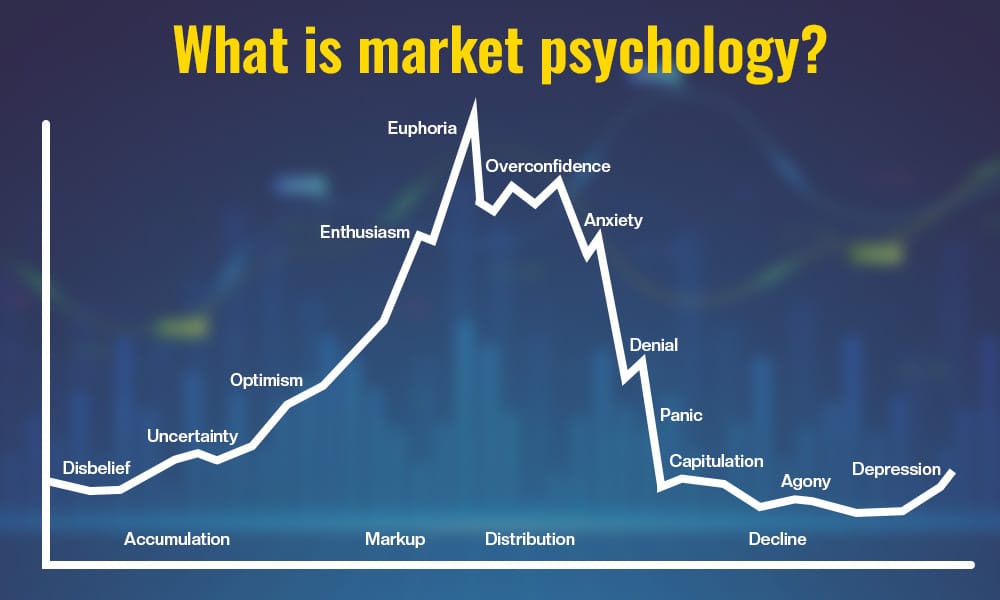When it comes to investing, most people focus on charts, indicators, earnings reports, and economic news. While all of these are important, there’s one crucial factor that often gets overlooked—stock market psychology. Understanding the emotional and psychological aspects of investing can make the difference between consistent gains and devastating losses.
What is Stock Market Psychology?

Stock market psychology refers to the collective emotions and behaviors of market participants. It encompasses fear, greed, hope, and regret—emotions that drive the decisions of traders and investors. The market, after all, is made up of people, and people are not always rational.
Understanding stock market psychology helps investors recognize emotional trends, avoid impulsive decisions, and stay grounded during market volatility.
Fear and Greed: The Twin Forces
The two dominant emotions in the stock market are fear and greed. These forces create market swings and influence investor behavior in dramatic ways.
- Greed drives investors to chase rising prices, often ignoring fundamentals. During bull markets, this leads to asset bubbles and overvaluation.
- Fear causes panic selling, especially during downturns. It’s what makes people sell at the bottom and miss opportunities for recovery.
A strong grip on stock market psychology enables you to avoid these traps. Recognizing when the crowd is acting emotionally can be a powerful signal to act contrarily.
Herd Mentality and Emotional Investing
Many retail investors fall victim to herd mentality. When everyone is buying, it feels safe to join in. When everyone is selling, the instinct is to run for the exit.
But successful investing often requires going against the crowd. Buying low and selling high means stepping away from popular opinion, which is easier said than done. That’s where mastering stock market psychology becomes essential. It trains you to stay calm when others are anxious and to remain cautious when others are euphoric.
The Role of Cognitive Biases
Cognitive biases are systematic errors in thinking that affect our decisions. In the context of stock market psychology, some common ones include:
- Confirmation Bias: Seeking information that supports your beliefs while ignoring contradictory data.
- Loss Aversion: The tendency to feel the pain of losses more than the pleasure of gains.
- Overconfidence: Believing you have better insight than the market, leading to excessive risk-taking.
Being aware of these biases helps investors develop discipline and make rational decisions based on data—not emotion.
Developing a Winning Mindset
Mastering stock market psychology is about cultivating emotional intelligence and mental resilience. Here are some ways to do that:
- Create a solid investment plan: Define your goals, risk tolerance, and strategies. A plan reduces impulsive decisions.
- Stick to your strategy: Even when the market gets volatile, trust your research and long-term perspective.
- Keep emotions in check: Meditation, journaling, and mindfulness can help manage stress and anxiety.
- Learn from mistakes: Treat every loss as a lesson. Review trades to understand what went wrong—psychologically and strategically.
Why Stock Market Psychology Matters More Than Ever
In today’s fast-paced markets, driven by headlines and social media hype, emotional investing is at an all-time high. Retail traders can get caught up in the moment, leading to irrational buying or selling decisions.
Whether you’re a day trader or a long-term investor, understanding stock market psychology can give you a major edge. It’s not just about what the market is doing—it’s about how people feel about what the market is doing.
Final Thoughts
The best investors aren’t just skilled analysts—they’re masters of their own minds. By focusing on stock market psychology, you can become more disciplined, more patient, and ultimately, more profitable.
Remember: the market is a reflection of human emotion. Master the psychology, and you master the market.
related article read and enjoyed
- Ethereum 3.0 Is Coming — Are You Ready?
 Ethereum has long been at the forefront of blockchain innovation.… Read more: Ethereum 3.0 Is Coming — Are You Ready?
Ethereum has long been at the forefront of blockchain innovation.… Read more: Ethereum 3.0 Is Coming — Are You Ready? - Top 5 Crypto Wallets in 2025 | Best Wallets for Security & DeFi
 In the fast-evolving world of cryptocurrency, choosing the right wallet… Read more: Top 5 Crypto Wallets in 2025 | Best Wallets for Security & DeFi
In the fast-evolving world of cryptocurrency, choosing the right wallet… Read more: Top 5 Crypto Wallets in 2025 | Best Wallets for Security & DeFi - 10 Best Crypto Exchanges Right Now (2025 Update)
 As the world of cryptocurrency continues to grow, finding the… Read more: 10 Best Crypto Exchanges Right Now (2025 Update)
As the world of cryptocurrency continues to grow, finding the… Read more: 10 Best Crypto Exchanges Right Now (2025 Update) - How to Buy Bitcoin Safely | Protect Your Investments & Avoid Scam
 How to Buy Bitcoin Safely: A Beginner’s Guide Bitcoin has… Read more: How to Buy Bitcoin Safely | Protect Your Investments & Avoid Scam
How to Buy Bitcoin Safely: A Beginner’s Guide Bitcoin has… Read more: How to Buy Bitcoin Safely | Protect Your Investments & Avoid Scam - Best Stock Market Book for Beginners & Investors
 When diving into the world of investing, one of the… Read more: Best Stock Market Book for Beginners & Investors
When diving into the world of investing, one of the… Read more: Best Stock Market Book for Beginners & Investors
